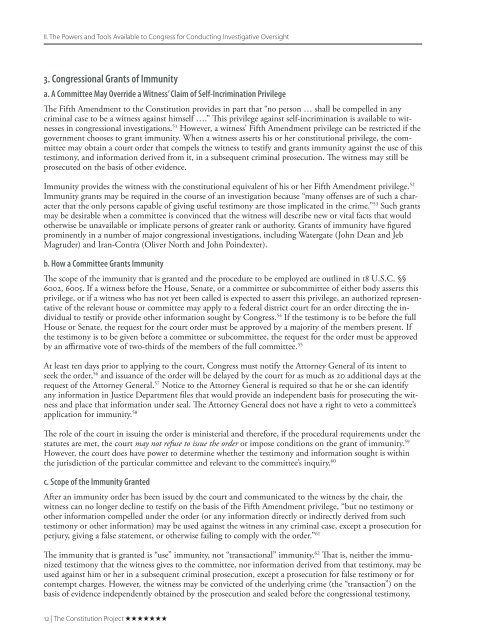When Congress Comes Calling
WhenCongressComesCalling
WhenCongressComesCalling
Create successful ePaper yourself
Turn your PDF publications into a flip-book with our unique Google optimized e-Paper software.
II. The Powers and Tools Available to <strong>Congress</strong> for Conducting Investigative Oversight<br />
3. <strong>Congress</strong>ional Grants of Immunity<br />
a. A Committee May Override a Witness’ Claim of Self-Incrimination Privilege<br />
The Fifth Amendment to the Constitution provides in part that “no person … shall be compelled in any<br />
criminal case to be a witness against himself ….” This privilege against self-incrimination is available to witnesses<br />
in congressional investigations. 51 However, a witness’ Fifth Amendment privilege can be restricted if the<br />
government chooses to grant immunity. <strong>When</strong> a witness asserts his or her constitutional privilege, the committee<br />
may obtain a court order that compels the witness to testify and grants immunity against the use of this<br />
testimony, and information derived from it, in a subsequent criminal prosecution. The witness may still be<br />
prosecuted on the basis of other evidence.<br />
Immunity provides the witness with the constitutional equivalent of his or her Fifth Amendment privilege. 52<br />
Immunity grants may be required in the course of an investigation because “many offenses are of such a character<br />
that the only persons capable of giving useful testimony are those implicated in the crime.” 53 Such grants<br />
may be desirable when a committee is convinced that the witness will describe new or vital facts that would<br />
otherwise be unavailable or implicate persons of greater rank or authority. Grants of immunity have figured<br />
prominently in a number of major congressional investigations, including Watergate (John Dean and Jeb<br />
Magruder) and Iran-Contra (Oliver North and John Poindexter).<br />
b. How a Committee Grants Immunity<br />
The scope of the immunity that is granted and the procedure to be employed are outlined in 18 U.S.C. §§<br />
6002, 6005. If a witness before the House, Senate, or a committee or subcommittee of either body asserts this<br />
privilege, or if a witness who has not yet been called is expected to assert this privilege, an authorized representative<br />
of the relevant house or committee may apply to a federal district court for an order directing the individual<br />
to testify or provide other information sought by <strong>Congress</strong>. 54 If the testimony is to be before the full<br />
House or Senate, the request for the court order must be approved by a majority of the members present. If<br />
the testimony is to be given before a committee or subcommittee, the request for the order must be approved<br />
by an affirmative vote of two-thirds of the members of the full committee. 55<br />
At least ten days prior to applying to the court, <strong>Congress</strong> must notify the Attorney General of its intent to<br />
seek the order, 56 and issuance of the order will be delayed by the court for as much as 20 additional days at the<br />
request of the Attorney General. 57 Notice to the Attorney General is required so that he or she can identify<br />
any information in Justice Department files that would provide an independent basis for prosecuting the witness<br />
and place that information under seal. The Attorney General does not have a right to veto a committee’s<br />
application for immunity. 58<br />
The role of the court in issuing the order is ministerial and therefore, if the procedural requirements under the<br />
statutes are met, the court may not refuse to issue the order or impose conditions on the grant of immunity. 59<br />
However, the court does have power to determine whether the testimony and information sought is within<br />
the jurisdiction of the particular committee and relevant to the committee’s inquiry. 60<br />
c. Scope of the Immunity Granted<br />
After an immunity order has been issued by the court and communicated to the witness by the chair, the<br />
witness can no longer decline to testify on the basis of the Fifth Amendment privilege, “but no testimony or<br />
other information compelled under the order (or any information directly or indirectly derived from such<br />
testimony or other information) may be used against the witness in any criminal case, except a prosecution for<br />
perjury, giving a false statement, or otherwise failing to comply with the order.” 61<br />
The immunity that is granted is “use” immunity, not “transactional” immunity. 62 That is, neither the immunized<br />
testimony that the witness gives to the committee, nor information derived from that testimony, may be<br />
used against him or her in a subsequent criminal prosecution, except a prosecution for false testimony or for<br />
contempt charges. However, the witness may be convicted of the underlying crime (the “transaction”) on the<br />
basis of evidence independently obtained by the prosecution and sealed before the congressional testimony,<br />
12 | The Constitution Project


